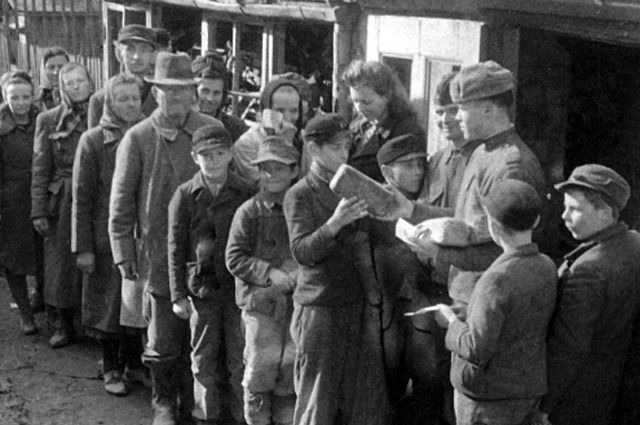Below is my translation from Russian of an article, published in “Argumenty i Fakty” on the 15th of April 2015, written by Alexander Kolesnichenko and Ekaterina Mirnaja.
Not only the TV series “Seventeen Moments of Spring” were banned in Ukraine, but also the medals and orders of the veterans of Great Patriotic War. Incidentally, it is now also impossible to call this war in this terms.
The new authorities threaten to send to jail all those who do not agree to equate communism and Nazism.
A Blow to the Veterans
The Supreme Rada (Ukrainian Parliament) approved a package of laws, which equates Soviet symbolism to the symbols of Nazi Germany. You can go to jail for 5 years for the public performance of the Anthem of the USSR or for marching under the red flag with the hammer and sickle. The country must remove all monuments to Soviet leaders and completely abandon the Soviet toponymy up to and including renaming of cities. That is, Dnepropetrovsk, Kirovograd, Dneprodzerzhinsk – all may sound in new ways. Renaming and removal of the monuments will affect primarily the unstable south-eastern regions. Including, for example, Artiomovsk, which is located 30 km from the front line. Even though there was recently conducted a referendum in the city, in which the citizens decided to leave the city’s name. “In the event of a change of names, people will need to renew passports and documents for real estate. Who will pay for it? – angrily demands Andrew Zolotarev, a political analyst in Kiev, and also draws attention to the fact that the symbolism will have to be chiselled down from hundreds of buildings. – Who will pay for the repair of façades?!”
But worse than wasting of any money, is the slap in the face, received by the Ukrainian veterans. Not only did Rada equate nationalists from the OUN and UPA, that is, those who worked during the war with the Nazis, to the veterans of the Great Patriotic War. Now it is not clear whether the elderly, who saved the world from fascism, are allowed to put on their medals on May the 9th – or if they’ll get thrown into prisons for 5 years for “Soviet propaganda”? “This is cynicism of the highest degree – to prevent the veterans to wear their orders the eve of the 70th anniversary of the Victory. The Victory Banner, too appears to be a symbol of the communist regime? – political analyst Mikhail Pogrebinsky told AiF. – I can not imagine how with such ideological line they are going to keep the country at least in its current borders.”

(Lenin’s present of 1922 included the following oblasts [counties] Harkov, Donetsk, Lugansk, Zaporozhje, Herson, Nikolaev, Odessa; Stalin’s present of 1939-1940,1945 included Lvov, Ternopol, Zakarpatie [Transcarpathia], Ivano-Frankovsk, Chernovick. [It should be remembered that it was Lenin that after 1917 revolution in Russia separated Ukraine into a separate state])
However, there indeed may be questions with the borders. Rada decided: from 1917 to 1991 a “criminal totalitarian regime” reigned in the country. But during the time when the Communists were “rampaging” in Ukraine, its territory markedly increased (see. Map). So the attempt to tear itself away from the Soviet past, casts doubt on the legitimacy of the Ukraine as a state. Because it actually was created by the Communists, with whom until recently many of those, who today denounce the Soviet regime, identified themselves. “For example, Turchynov was head of the department for propaganda, Poroshenko was a member of the Communist Party, Nalivaychenko was a KGB agent. Whoever you take, they were all members of the party! Even Yatsenyuk was one of the activists of the Young Communist League, and his father – the head of the Party cell,” – says political analyst Yuri Gorodnenko.
On All Fronts
The new Ukrainian laws, according to the Russian Foreign Ministry, are not just an attempt to “erase from the memory of millions of Ukrainians the true pages of the history of Ukraine of the XX century”, all is more dangerous and more serious: “Against the backdrop of a declared combat on the supposedly totalitarian past, Kiev introduced a truly totalitarian methods to eliminate unwanted parties and non-governmental organizations… Sets rigid censorship of political thought for compliance, perverted notions of good and evil… While hiding behind the rhetoric of the civil rights and liberties, Ukrainian lawmakers in fact passed acts that directly restrict the exercise of rights to freedom of thought, conscience, belief and expression.” It is no coincidence that this decision was preceded by the expulsion of the Communist Party of Ukraine from the Parliament, along with the attempts to ban it and prosecute its leaders.
Meanwhile, this week marks one year of the so-called “anti-terrorist operation” (ATO) in the south-eastern Ukraine. Sad anniversary was marked by fire from tanks near Mariupol and Donetsk. The “economic war” with Donbass continues: a Ukrainian Foreign Ministry confirmed that Kiev would not give a single hrivna to people living in DNR and LNR. Pensions and benefits are accrued to the accounts of citizens, but it is impossible to get them while Ukraine has no control over these territories. It is interesting: do Kiev “fighters with the past” seriously expect to regain control of millions of people whom they continue to exterminate by shellings, blockade, and, now, with the ideological taboos?





